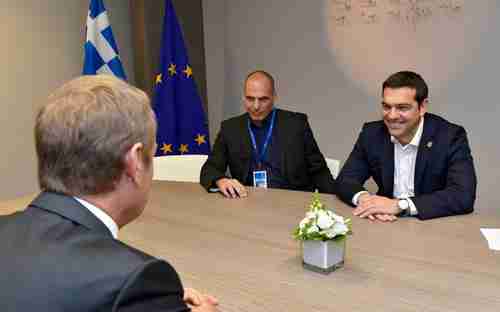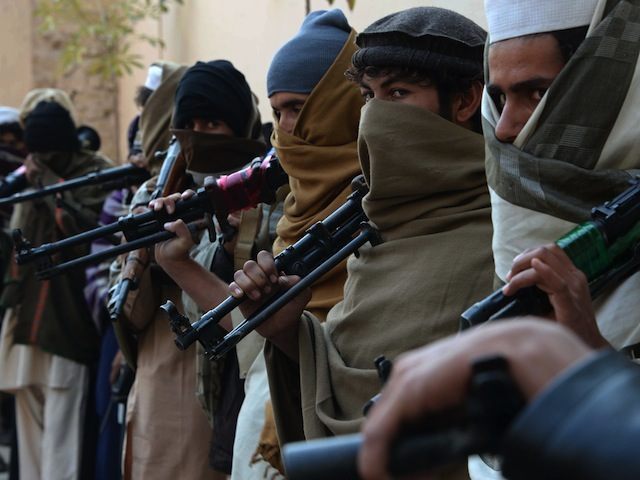This morning’s key headlines from GenerationalDynamics.com
- Report: Greece’s debt crisis being kicked down the road
- Afghan Taliban strikes Afghan parliament in Kabul
- Afghan Taliban close to seizing the city of Kunduz
Report: Greece’s debt crisis being kicked down the road

The wily Greek finance minister Yanis Varoufakis watches as Greek PM Alexis Tsipras grins broadly at something amusing said by European Commission president Donald Tusk (Kathimerini)
There are reports that Greek officials have finally made some concessions, especially raising taxes on businesses and wealthy individuals, and that the lending institutions are starting from those, and are close to making a deal that will allow Greece to make its 1.5 billion euro debt payment to the International Monetary Fund on June 30.
If a “deal” is made, all it will do is kick the can down the road for a few weeks. The deal is for the last 7.2 billion euro tranche of the second bailout loan. That money will permit Greece to meet its IMF payment, as well as several other payments due in July and August, but no more.
What Greece needs is a third bailout loan. So assuming that this “deal” is concluded later this week, then negotiations on the new bailout loan will have to begin soon, and the drama will start all over again.
On Bloomberg TV on Monday, there was an interview with Anna-Michel Asimakopoulou, who is the finance minister for Greece’s opposition New Democracy party, which was the government party before Alexis Tsipras’s victory in January’s election. Asimakopoulou expressed a great deal of bitterness about what Tsipras has done (my transcription):
Mr. Tsipras in 5 months has managed to bring the real economy to a standstill, turn us into a recessionary cycle, undo every decent thing that has been done, and now we’re facing the following choice: A deal, which is going to cost the Greek people 5 billion euros in measures, on the one hand, and the absolutely worst case scenario, which is no deal, which means we’re facing uncharted waters, bankruptcy, and a possible Grexit [Greek exit from the eurozone]. […]
This is a critical thing for Greece’s future. It’s not a little bitty decision – it’s a huge decision. He is not allowed to jeopardize our future in the eurozone – he doesn’t have the mandate to do that. And yes, now people are taking money out of the banks, now the public sector has stopped making any payments towards anybody except for wages and salaries and we’re not really sure that’s gonna last. […]
Our main concern with this deal, assuming it happens and we hope it does, it’s taxes, taxes and more taxes. There’s nothing that will favor growth. We think growth is gonna come from the private sector, from businesses. We’re all for privatizations. We don’t want a bloated public sector. Mr. Tsipras has hired 5,000 people in the public sector in the last three months. That has a price tag, and the price tag is being paid by the Greek people.
Even if a deal is made, then it has to be sold to the Greek people, who have been promised no more austerity, and to the German people, who don’t want to pay any more to bail out Greece.
As I have said repeatedly, no solution exists to Greece’s debt crisis. I think everyone believes that the can will run out of road at some point, but we don’t know when. Kathimerini and BBC
Afghan Taliban strikes Afghan parliament in Kabul
It is the start of the Afghan Taliban’s summer offensive, and they have scored two major victories in the last three days: A major terrorist attack on the Afghan Parliament in Kabul on Monday, and the imminent takeover of a major Afghan city in northern Afghanistan, for the first time since 2001.
On Monday there was a terrorist attack captured on live TV in Kabul, the capital city of Afghanistan. A suicide bomber blew himself up outside the Afghan Parliament complex, bringing down a part of the roof, and then six other terrorists rushed in, armed with assault rifles and rocket propelled grenades, but they were not successful in breaching the compound’s gates. All seven terrorists were killed, as was a woman civilian. 30 civilians were wounded.
The Parliament building is the most heavily guarded area in Kabul. Every time there is a successful terrorist attack in central Kabul, there is the usual commentary demanding an investigation about how terrorists were able to get so close to the center of power. But the situation seems to be worsening.
However, such attacks have been occurring with increased regularity, as the Nato and American forces have been withdrawn. The attack fits a pattern of high-profile assaults on heavily fortified buildings in the capital. Last month, car bombs targeted the Justice Ministry, and attackers stormed two guesthouses used by foreigners. Reuters and AFP and Hindustan Times
Afghan Taliban close to seizing the city of Kunduz
Taliban forces have captured two villages near the city of Kunduz in the last two days, and are close to seizing Kunduz itself, forcing tens of thousands of refugees to flee their homes. With a population of 300,000, this will be the first time since 2001, when American forces defeated the Taliban after 9/11, that the Taliban have been in control of a large city. Whoever controls Kunduz, a vast, rich agricultural region that was a former Taliban bastion, controls the roads to northeastern Afghanistan as well as smuggling and trade routes into neighboring Tajikistan and the rest of Central Asia.
The government in Kabul has dispatched reinforcements, including Afghan Special Forces and their U.S. advisers and trainers, to try to repel the insurgents and rescue about 75 soldiers and policemen trapped inside their district base. But the Afghan forces are spread very thin, fighting on several fronts. Washington Post and Stars and Stripes
KEYS: Generational Dynamics, Greece, Alexis Tsipras, Yanis Varoufakis, Anna-Michel Asimakopoulou, New Democracy, Afghanistan, Taliban, Kabul, Kunduz
Permanent web link to this article
Receive daily World View columns by e-mail

COMMENTS
Please let us know if you're having issues with commenting.